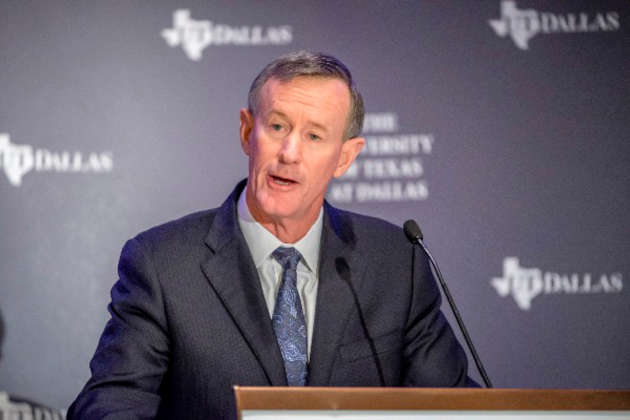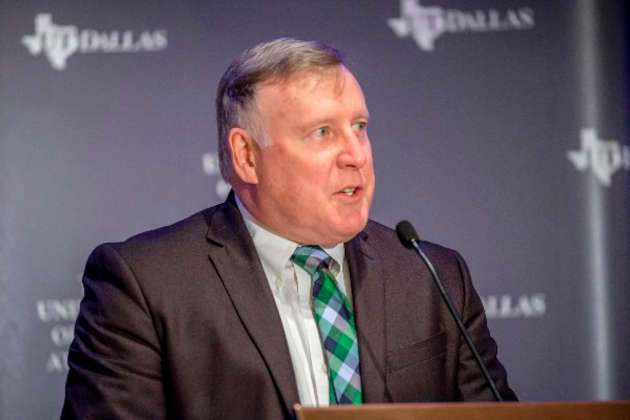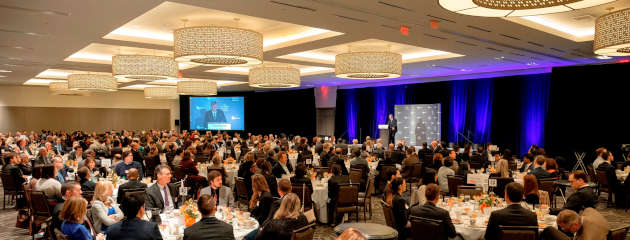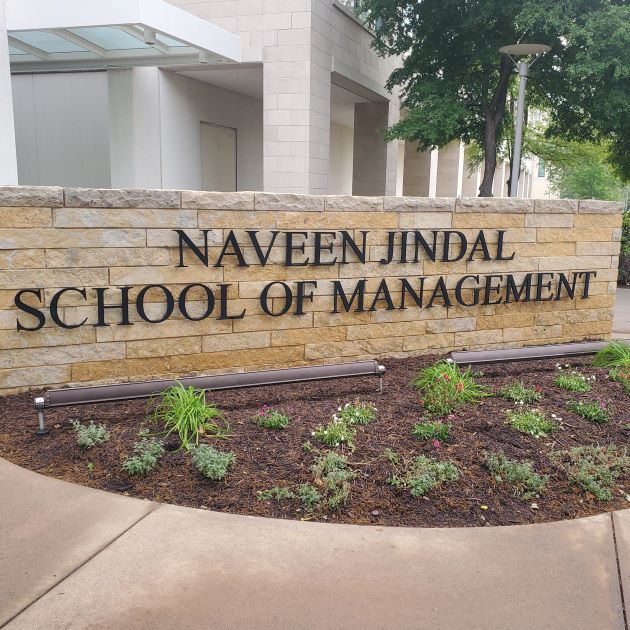
UT System Chancellor William H. McRaven shared lessons he has learned about transformative leadership and how they can be applied to business in the keynote address he delivered Nov. 1 at the Scholarship Breakfast, the largest fundraiser of the Naveen Jindal School of Management. McRaven, a retired four-star Navy admiral, learned those lessons while commanding U.S. special operations forces and related them to an audience of nearly 400 at the annual event, which was held at the Westin Galleria in Dallas.
The Scholarship Breakfast was established with two missions — to offer a forum for discussing relevant business issues and to support the educational goals of undergraduate and graduate students from the Jindal School. The nearly 400 corporate representatives, alumni, faculty, staff and students in attendance were a testament to the success of the event as a platform for thought leadership and a conduit for community support.
Dr. Hasan Pirkul, dean and Caruth Chair of the Jindal School, opened the program by thanking guests for their support in making the Jindal School better every year and introducing special guests from the Dallas Independent School District. He concluded by introducing Dr. Richard C.Benson, president of The University of Texas at Dallas.

Benson introduced McRaven by explaining that the chancellor’s Quantum Leaps initiative “sets the stage for UT Dallas and the other institutions to collaborate in ways that will make a difference for the state and the world.”
Notable guests included members of the president’s cabinet; Jindal School Advisory Council Chairman Ray Hemmig and other council members; Trisha Cunningham, president and CEO of North Texas Food Bank; and Mahesh Shetty, MBA’99, chairman of the US India Chamber of Commerce.
The event raised enough to fund 40 scholarships. Since its inception, the breakfast has raised more than $700,000. Dallas-Fort Worth business leaders, JSOM alumni and UT Dallas faculty and staff are the primary audience for the gathering.
Top-level sponsors this year were The Center for Brain Health at UT Dallas, Lennox International, Trans Global Technologies Inc. and 25 corporate and other supporters. Among these were companies represented on the advisory council and the UT Dallas Development Board.
McRaven shared a story from his time in the U.S. special operations forces. A few years ago, he said, a GS-9 employee — a midlevel civil servant who worked as an analyst at an undisclosed embassy — had awoken an ambassador during the middle of the night, a violation of protocol and chain of command.
“This particular young lady believed she had discovered some time-sensitive intelligence on a bad guy — and by bad guy I mean a really, really bad guy — a guy responsible for the death of hundreds of Americans,” he said. “And we'[d] been hunting him for quite some time.”

The analyst’s initiative led to the capture and imprisonment of the enemy combatant. McRaven took that lesson to heart and initiated a culture shift that allowed for increased input, collaboration and communication from every corner of the command — from privates to generals and everyone in between.
“A lot of people were uncomfortable with it, but we didn’t care,” he said. “In fact, that was the point. Our enemies were moving with unprecedented speed, and we needed to move faster. We needed the best ideas to bubble up quicker than ever before, and we needed to test those ideas against every possible perspective — right now, today.”
McRaven had built a human network based on Metcalfe’s law, a concept stating that the value of a network to its users grows as the square of the total number of its users. Lessons learned from that experience have relevance to the challenges that businesses, state governments and our nation currently face. The same type of multidirectional human network he used in the military, he said, applies to business. Each additional person added to the network increases the network’s value exponentially.
“If your people — and I mean all of your people — do not feel connected to the mission; if they don’t feel in their bones that you not only want but demand their ideas; if they don’t know that their career trajectory will be defined by the quality of their work — not by their gender, their race, their ethnicity or their sexual orientation — if they are just marking time; then any of your business’s past victories won’t matter,” he said. “You’ll be on the road to defeat.”
He then expanded the concept to the state, national and global levels.
“Our state’s economy is the envy of every nation, not because we stand alone, but because the exact opposite is true,” he said. “We engage with Canada, with South Korea, with Mexico.”
The mere act of engagement, however, is not enough, he said, adding that you have to give people something with which to engage.
“I’ve been to more than 90 countries, and I can tell you the people in those countries don’t just engage with the United States of America — they engage with the idea of the United States of America, the nation of immigrants, a union far from perfect but always striving to be more perfect and holding itself accountable through its embrace of a free press in the rule of law,” he said. “I sometimes worry that if we lose the narrative, if we lose sight or turn away from that, from what we have always represented, the world will turn away from us, and less engagement is going to mean less peace and less prosperity.”
McRaven then sounded a more optimistic note:
“I believe that we as a nation will choose to become more — not less — engaged, more open, more inclusive, more determined to live the beliefs our country was founded on, eager to set an example and invite the world to follow. I believe we will do these things not just because it’s in our interest but because it’s who we are.”
He concluded his address by offering advice to audience members, especially current and future business leaders: “No matter what organization you’re a part of, think long and hard about who and what you are,” he said. “Make sure you’re giving your people, your partners and, of course, your customers a reason to engage beyond just self-interest. Articulate your values and, more importantly, live those values every day. Share with every member of your network a vision that sparks their imagination. Enlist them in the quest to turn that vision into reality. Tell them you can’t do it without them. They already know that, of course, but they need to be sure that you know it.”





